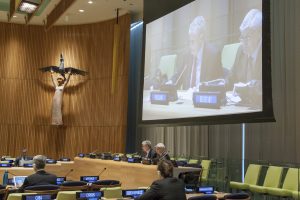Opening remarks by Mogens Lykketoft, President of the UN General Assembly, at “Trends and Perspectives in Commodities Markets and Their Implications in Commodity-Dependent Developing Countries – CDDCs”
16 May 2016

©UN Photo/Loey Felipe
Excellencies, ladies and gentlemen, it is my pleasure to open this dialogue today.
As the United Nations celebrates its 70th anniversary, the international community is gearing up to respond to a brand new framework for sustainable development with Sustainable Development Goals, the Addis Ababa Action Agenda and the Paris Climate Agreement.
Implementation of these historic agreements will require the mobilization of resources at a scale never attempted before.
Today, I hope that this dialogue may offer some assessment of the challenges and policy frameworks countries should be mindful of so as to better and more fully reap the benefits of their commodities industries.
We all know that the future we want and have committed to, will not come about over-night.
Revenues obtained from commodity production and exports, will therefore remain critical for developing countries, in particular, in terms of mobilizing the resources needed as governments begin implementing the SDGs.
The end of the rising trend of commodities prices, despite differences across product lines, has however become a growing concern for policy makers in both emerging economies and many least developing countries.
The so-called commodity “super cycle” provided an enabling environment, especially for the Least Developing Countries (LDCs), to perform considerably better that in the past.
But for Landlocked Developing Countries (LLDCs), the impact of this “super cycle” was somewhat diminished.
Comparably challenging natural barriers, coupled with the urgency to tackle climate change, created similar challenges for Small Island Developing Countries (SIDS).
Developing countries in special situations, therefore, face a set of particular challenges, especially given how declining commodity prices threatens the sustainability of some countries’ debt positions.
But in the Addis Ababa Action Agenda, as adopted in July 2015, a number of policy responses were put forward to deal with the challenges and risks associated with this commodities price downward curve and broader challenges those surrounding natural resources.
These included:
- encouraging investment in value addition and processing of natural resources and productive diversification;
- addressing excessive tax incentives related to investments in extractive industries;
- reinforcing corporate transparency and accountability and encouraging countries to implement measures to ensure transparency;
- promoting capacity development, including sharing best practices and peer learning, as well as capacity-building for contract negotiations for fair and transparent concession, revenue and royalty agreements, and for monitoring the implementation of contracts.
- And promoting international trade as an engine for inclusive economic growth and poverty reduction
These and other aspects of that Agenda, through global partnership and the support of the UN system, provide us with a solid set of tools to manage challenges in commodities markets and to move forward with SDG implementation.
I hope this dialogue helps raise awareness and stimulate action for the further action in this regard.
Thank you.

